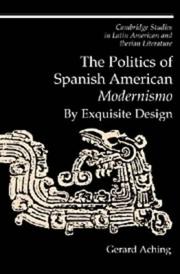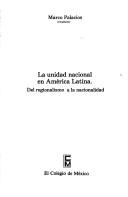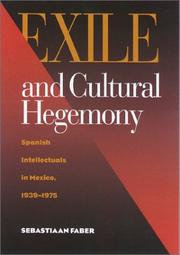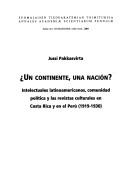| Listing 1 - 10 of 12 | << page >> |
Sort by
|
Book
Year: 1959 Publisher: Berkeley [Calif.] : University of California Press,
Abstract | Keywords | Export | Availability | Bookmark
 Loading...
Loading...Choose an application
- Reference Manager
- EndNote
- RefWorks (Direct export to RefWorks)
Book
ISBN: 0292719388 0292734808 Year: 2011 Publisher: Austin [Tex.] : University of Texas Press,
Abstract | Keywords | Export | Availability | Bookmark
 Loading...
Loading...Choose an application
- Reference Manager
- EndNote
- RefWorks (Direct export to RefWorks)
Natives of the Iberian Peninsula and the twenty countries of Latin America, as well as their kinsfolk who've immigrated to the United States and around the world, share a common quality or identity characterized as la hispanidad. Or do they? In this lively, provocative book, two distinguished intellectuals, a cultural critic and a historian, engage in a series of probing conversations in which they try to discern the nature of la hispanidad and debate whether any such shared identity binds the world's nearly half billion people who are "Hispanic." Their conversations range from La Reconquista and Spanish monarchs Ferdinand and Isabella, who united the Spanish nation while expelling its remaining Moors and Jews, to the fervor for el fútbol (soccer) that has swept much of Latin America today. Along the way, they discuss a series of intriguing topics, including the complicated relationship between Latin America and the United States, Spanish language and the uses of Spanglish, complexities of race and ethnicity, nineteenth-century struggles for nationhood and twentieth-century identity politics, and popular culture from literary novels to telenovelas. Woven throughout are the authors' own enlightening experiences of crossing borders and cultures in Mexico and Chile and the United States. Sure to provoke animated conversations among its readers, What is la hispanidad? makes a convincing case that "our hispanidad is rooted in a changing tradition, flexible enough to persist beyond boundaries and circumstances. Let us not fix it with a definition, but allow it instead to travel, always."
Civilization, Hispanic. --- Pan-Hispanism. --- Hispanidad --- Hispanoamericanism --- Pan-Hispanic movement --- Civilization, Spanish --- Hispanic civilization --- Spanish civilization
Book
Year: 1956 Publisher: Madrid : Ediciones Cultura Hispánica,
Abstract | Keywords | Export | Availability | Bookmark
 Loading...
Loading...Choose an application
- Reference Manager
- EndNote
- RefWorks (Direct export to RefWorks)
Pan-Hispanism --- Latin America --- Amérique latine --- Politics and government --- Politique et gouvernement
Book
ISBN: 847481443X Year: 1987 Volume: 175 Publisher: Salamanca, España : Ediciones Universidad de Salamanca,
Abstract | Keywords | Export | Availability | Bookmark
 Loading...
Loading...Choose an application
- Reference Manager
- EndNote
- RefWorks (Direct export to RefWorks)
Judaism --- Christianity and other religions --- Pan-Hispanism --- Judaïsme --- Christianisme --- Doctrines --- Relations --- Christianity --- Religious aspects

ISBN: 0521572495 9780521572491 Year: 1997 Volume: 11 Publisher: Cambridge, United Kingdom New York Cambridge University Press
Abstract | Keywords | Export | Availability | Bookmark
 Loading...
Loading...Choose an application
- Reference Manager
- EndNote
- RefWorks (Direct export to RefWorks)
"The Politics of Spanish American "Modernismo" elucidates the professional and literary means through which Spanish American modernistas negotiated a cultural politics of rapprochement with Spain and Europe in order to differentiate their Americanness from that of the United States. Gerard Aching argues that these turn-of-the-century men of letters were in fact responsible for the burgeoning role that intellectuals and writers had (and continue to have) in defining pan-Hispanism."--BOOK JACKET. "Aching's arguments contribute to current debates about modernity and the colonial/postcolonial condition in nineteenth-century Hispanic literatures. The interdisciplinary approach will appeal to scholars in literature, cultural studies, Latin American studies, and history."--Jacket.
Hispanidad --- Hispanoamericanism --- Pan-Hispanic movement --- Pan-Hispanism --- Pan-Hispanisme --- Panhispanisme --- Spanish American literature --- 20th century --- History and criticism --- Modernism (Literature) --- Latin America --- Politics and literature --- Intellectual life

ISBN: 9681202236 6076287780 Year: 1983 Publisher: El Colegio de México
Abstract | Keywords | Export | Availability | Bookmark
 Loading...
Loading...Choose an application
- Reference Manager
- EndNote
- RefWorks (Direct export to RefWorks)
El regionalismo, en el contexto de la formación nacional de América Latina, reviste múltiples características que desbordan los enfoques simplistas del "desarrollo capitalista y dependiente". El análisis del regionalismo, la centralización política y la consolidación nacional de América Latina, es realizado con el máximo rigor por un grupo de especialistas de diversos países de nuestra América.
Nacionalismo --- Regionalismo --- Latin American federation. --- Regionalism --- Federation of Latin America --- Latin American integration --- Latin American union --- Federal government --- International organization --- Pan-Americanism --- Pan-Hispanism --- History of the Americas
Book
ISBN: 0268106959 9780268106966 0268106967 9780268106959 9780268106935 Year: 2020 Publisher: Notre Dame, Ind. University of Notre Dame Press
Abstract | Keywords | Export | Availability | Bookmark
 Loading...
Loading...Choose an application
- Reference Manager
- EndNote
- RefWorks (Direct export to RefWorks)
Pan-Hispanism --- International relations --- History. --- History of Spain --- History of Latin America --- anno 1800-1899 --- anno 1900-1909 --- anno 1910-1919 --- anno 1920-1929 --- anno 1930-1939

ISBN: 0826514227 9780826514226 9786612297120 1282297120 0826591663 1423731417 Year: 2002 Publisher: Nashville : Vanderbilt, University Press,
Abstract | Keywords | Export | Availability | Bookmark
 Loading...
Loading...Choose an application
- Reference Manager
- EndNote
- RefWorks (Direct export to RefWorks)
Intellectuals --- -Nationalism --- -Pan-Hispanism --- Political refugees --- -Political refugees --- -Politics and culture --- -Spaniards --- -Hispanidad --- Hispanoamericanism --- Pan-Hispanic movement --- Spanish people --- Ethnology --- Culture --- Culture and politics --- Asylum seekers --- Refugees, Political --- Refugees --- Consciousness, National --- Identity, National --- National consciousness --- National identity --- International relations --- Patriotism --- Political science --- Autonomy and independence movements --- Internationalism --- Political messianism --- Intelligentsia --- Persons --- Social classes --- Specialists --- Attitudes --- History --- -History --- -Intellectual life --- -Political aspects --- Frente Popular (Spain) --- Mexico --- Spain --- -Refugees. --- Meksiko --- Stany Zjednoczone Meksyku --- Meksyk --- Estados Unidos Mexicanos --- Meḳsiḳe --- Mexique (Country) --- Messico --- Méjico --- República Mexicana --- United States of Mexico --- United Mexican States --- Anáhuac --- Espanja --- Spanien --- Hiszpania --- Spanish State --- España --- Estado Español --- Espagne --- Hispania --- Sefarad --- Sepharad --- Shpanye --- Shpanie --- Reino de España --- Kingdom of Spain --- Reino d'Espanya --- Reinu d'España --- Espainiako Erresuma --- Regne d'Espanya --- Reiaume d'Espanha --- Espanya --- Espanha --- スペイン --- Supein --- イスパニア --- Isupania --- メキシコ --- Mekishiko --- מקסיקו --- Nationalism --- Pan-Hispanism --- Politics and culture --- Spaniards --- Hispanidad --- Intellectual life --- Political aspects --- Refugees.

ISBN: 9514108264 9789514108266 Year: 1997 Volume: 290 290 Publisher: Helsinki: Academia scientiarum Fennica,
Abstract | Keywords | Export | Availability | Bookmark
 Loading...
Loading...Choose an application
- Reference Manager
- EndNote
- RefWorks (Direct export to RefWorks)
"Seeks to gauge the debate between continentalism versus incipient nationalism by analyzing two of the leading intellectual journals in Latin America during the 1920s: Mariátequi's Amauta and the Costa Rican García Monge's Reportario Americano. Links emerging continentalism, as expressed by the intellectuals in these journals, with Arielismo, Aprismo, and most importantly indigenismo. Book's findings have application for present-day differing self-perceptions of nation and ethnicity"--Handbook of Latin American Studies, v. 58.
Latin American federation. --- Nationalism --- Latin American federation --- -Consciousness, National --- Identity, National --- National consciousness --- National identity --- International relations --- Patriotism --- Political science --- Autonomy and independence movements --- Internationalism --- Political messianism --- Federation of Latin America --- Latin American integration --- Latin American union --- Federal government --- International organization --- Pan-Americanism --- Pan-Hispanism --- -Latin American federation --- Nationalism - Latin America. --- Periodiques latino-americains --- Costa rica --- Perou --- Histoire --- 20e siecle --- Intellectuels --- Fédération latino-américaine. --- Nationalisme --- Activité politique. --- Peru --- Costa Rica --- Pérou --- History. --- Histoire.
Periodical
ISSN: 07190948 07182910 Year: 1996 Publisher: Iquique: Instituto de Estudios Internacionales (INTE), Universidad Arturo Prat
Abstract | Keywords | Export | Availability | Bookmark
 Loading...
Loading...Choose an application
- Reference Manager
- EndNote
- RefWorks (Direct export to RefWorks)
Latin American federation --- Latin American federation. --- International economic integration. --- Diplomatic relations. --- Latin America --- Latin America. --- Economic integration --- Foreign relations --- Relations --- Common markets --- Economic integration, International --- Economic union --- Integration, International economic --- Markets, Common --- Union, Economic --- International economic relations --- Federation of Latin America --- Latin American integration --- Latin American union --- Federal government --- International organization --- Politics and government --- Pan-Americanism --- Pan-Hispanism --- Asociación Latinoamericana de Libre Comercio countries --- Neotropical region --- Neotropics --- New World tropics --- Spanish America
| Listing 1 - 10 of 12 | << page >> |
Sort by
|

 Search
Search Feedback
Feedback About UniCat
About UniCat  Help
Help News
News